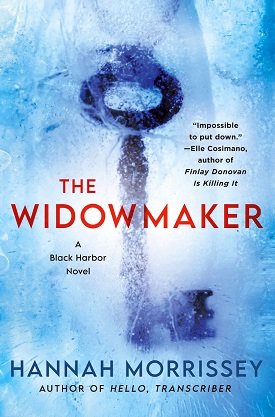Ruth Ware has been one of my go-to crime writers ever since I first read her debut, IN A DARK, DARK WOOD. With engaging, addictive plotting and a style reminiscent of Agatha Christie, Ware has become a household name both in the UK and US—and deservedly so. I consider her a personal favorite author, and I’m thrilled to help celebrate the publication of her newest release, THE LYING GAME, with a Q&A with Ruth Ware herself! THE LYING GAME releases in the US today, 7/25/17, and is now available at your favorite bookstore.
You can read my review of THE LYING GAME here. I loved this book for its engaging cast of female characters and the way that Ware masterfully develops a taut, addictive suspense story told largely through the recounting of these characters' memories. THE LYING GAME delves into a crime committed in the past, and brings readers into the heart of a group of women haunted by its shadow; it's tense, addictive, and not to be missed.
Many thanks to Ruth for taking the time to answer my questions. I’m thrilled to share this Q&A with one of my favorite suspense writers!
THE LYING GAME - Plot Summary:
On a cool June morning, a woman is walking her dog in the idyllic coastal village of Salten along a tidal estuary known as the Reach. Before she can stop him, the dog charges into the water to retrieve what first appears to be a wayward stick, but to her horror, turns out to be something much more sinister...
The next morning, three women in and around London—Fatima, Thea, and Isabel—receive the text they had always hoped would NEVER come, from the fourth in their formerly inseparable clique, Kate, that says only, “I need you.”
The four girls were best friends at Salten, a second rate boarding school set near the cliffs of the English Channel. Each different in their own way, the four became inseparable and were notorious for playing the Lying Game, telling lies at every turn to both fellow boarders and faculty, with varying states of serious and flippant nature that were disturbing enough to ensure that everyone steered clear of them. The myriad and complicated rules of the game are strict: no lying to each other—ever. Bail on the lie when it becomes clear it is about to be found out. But their little game had consequences, and the girls were all expelled in their final year of school under mysterious circumstances surrounding the death of the school’s eccentric art teacher, Ambrose (who also happens to be Kate’s father).
Atmospheric, twisty, and with just the right amount of chill that will keep you wrong-footed—which has now become Ruth Ware’s signature style—The Lying Game is sure to be her next big bestseller. Another unputdownable thriller from the Agatha Christie of our time.
Q&A: RUTH WARE
Crime by the Book: What inspired you to write THE LYING GAME?
Ruth Ware: Part of it was definitely my childhood love of boarding school stories. I loved all the glamour of it, the “apple pie” beds, the midnight feasts, the secret language of dorms and splasheries and cubies. But even at that age I could tell that the reality of being shut up 24/7 with your school friends might not be quite as rosy as depicted... and that fascination with the sharp edge of the fantasy definitely fed into the Lying Game.
CBTB: If you could choose three adjectives to describe THE LYING GAME, which three would you choose?
RW: Ooh... this is hard! Erm... intense... melancholic... retribution. (I'm aware the last one is a noun, sorry!)
CBTB: This story centers around four young women: Fatima, Thea, Isabel, and Kate. Is there one particular character with whom you identify most closely? Or are there pieces of yourself that you recognize across the women?
RW: I guess there are pieces of me in all the women but Isa is probably the one I relate to most closely, partly because she's the narrator, and you always identify with the voice you're telling the story in, but partly because her experiences as she adjusts to life as a new mother are the most autobiographical bits of the story.
CBTB: A good deal of this novel takes place in or relates to events that occurred at a boarding school, Salten. It seems to me that there’s something perennially appealing about novels set against a boarding school backdrop. What made you want to explore boarding school life in your newest thriller? Were you a boarding school student yourself?
RW: I was not, but I did adore boarding school stories – I began with Enid Blyton's Malory Towers series, moved onto Elinor M Brent Dyer, and then graduated onto darker stories like Frost in May, which explore the destructive side of boarding school life. I love the curious dichotomy of boarding school life – on the one hand, enormous independence from parental scrutiny, on the other, a quite literal captivity far greater than teenagers living at home experience.
CBTB: I’m always interested to learn a bit about the process of writing a novel. What are the first steps you take when you first get the idea for a new book?
RW: The ideas for my books can come from anywhere – a place I've visited, a fear I've experienced, a mishmash of real life and films and books. Generally my books start off as a tiny kernel – a “what if” or a single scene, and then gradually a load of other ideas, questions and preoccupations coalesce around them until a plot forms.
I generally have a starting point and a vague idea of the end and a few scenes along the way, but I don't usually write those down unless someone at my publisher needs an outline for some reason. They exist as a conversation in my head for about six months until I start writing.
CBTB: What does an ordinary day look like for you? Do you have set writing routines?
RW: I have school-age children so my day starts after I drop them off at school and ends when I pick them up around 3 – interrupted by various stints of admin and social media procrastination!
CBTB: When you’re not writing, do you enjoy reading crime books as well? If so, can you share a few authors whose books you’ve recently enjoyed?
RW: I loved Erin Kelly's He Said / She Said – I am simply in awe of her plotting (and rather jealous of such a fantastic concept). And I also really loved Liz Nugent's Unravelling Oliver. She uses half a dozen different narrators which is a trick that's really hard to pull off, and can result in lots of flicking back and forth as you try to remember who the hell is speaking now, but her mastery over her narrative voices is brilliant.
CBTB: What’s next for you? Can we look forward to another Ruth Ware thriller next summer?
RW: I'm writing hard on a fourth book so yes, fingers crossed, there will be another book out next summer. I don't want to jinx it too much, but I will say it's set in Cornwall (think Poldark, Daphne du Maurier territory, although present day) and has a strong tarot theme...
Many, many thanks to Ruth for answering my questions, and to her publisher for facilitating this Q&A! I’m absolutely thrilled that THE LYING GAME is now out in the world, and hope you’ll enjoy reading it as much as I did.
Book Details:
Read CBTB's Review of THE LYING GAME
Hardcover: 384 pages
Publisher: Gallery/Scout Press (July 25, 2017)
Language: English
ISBN-13: 978-1501156007
Crime by the Book is a participant in the Amazon Services LLC Associates Program, an affiliate advertising program designed to provide a means for sites to earn advertising fees by advertising and linking to Amazon.com. This in no way affects my opinion of the above book.













Home ownership feel like a distant dream? Zillow listings have you convinced you’ll be renting for the rest of your life? The woman at the heart of Carissa Orlando’s debut The September House feels your pain—and she’s prepared to put up with a lot if it means she and her husband can finally have a place to call their own. In this case, that might just mean living in a house that’s haunted. Playful and irreverent, spine-tingling and spooky, The September House puts a fresh spin on the classic haunted house story, delivering an immersive tale about the secrets lurking within one building’s walls, and within the lives of its inhabitants.